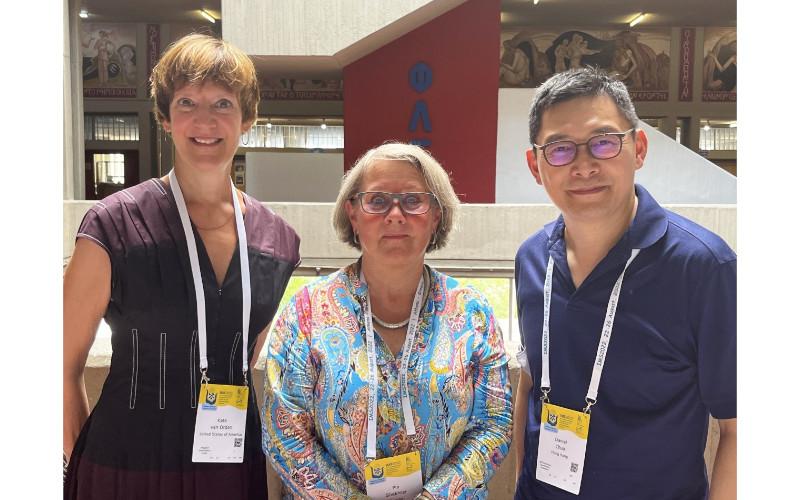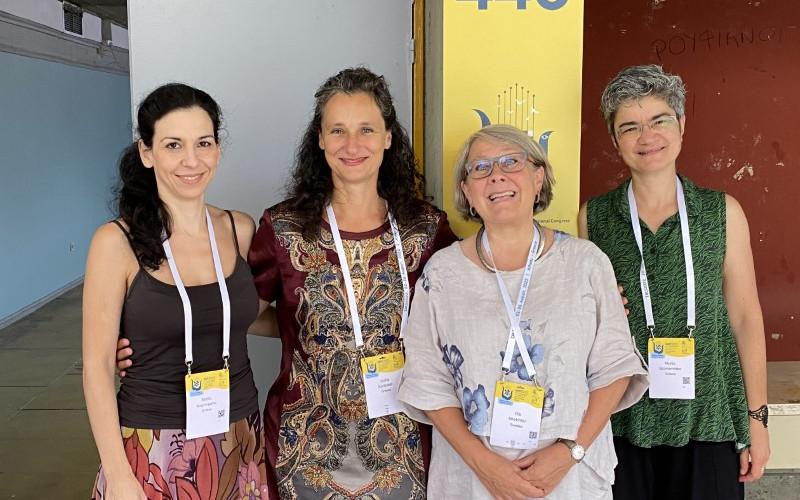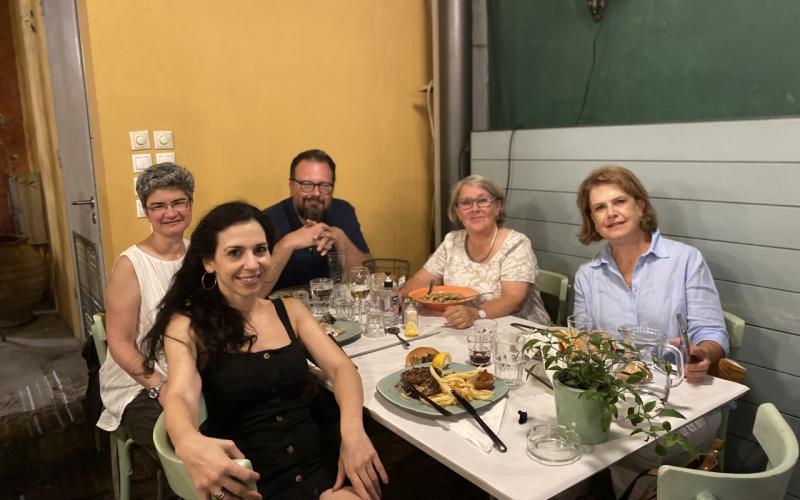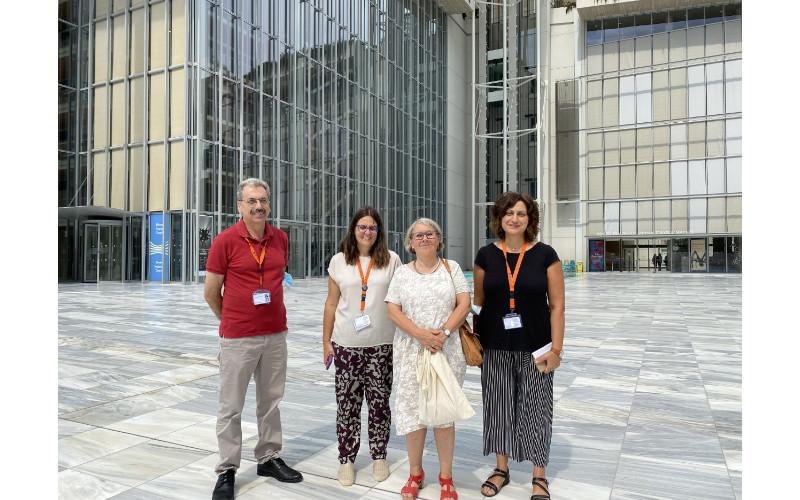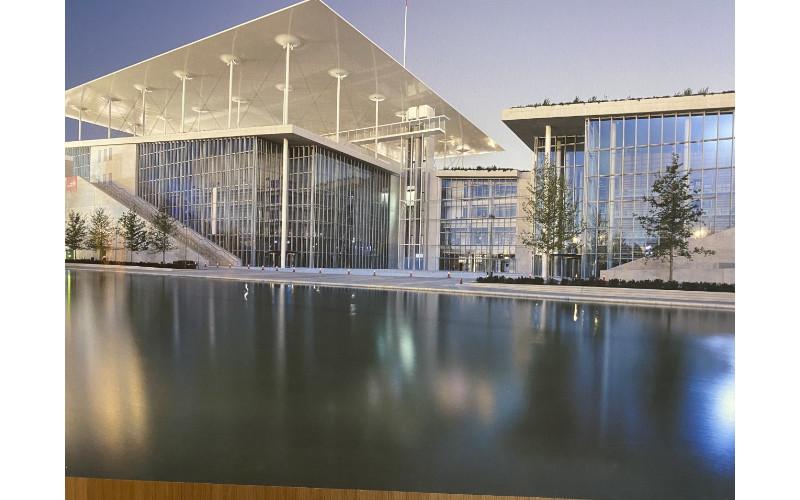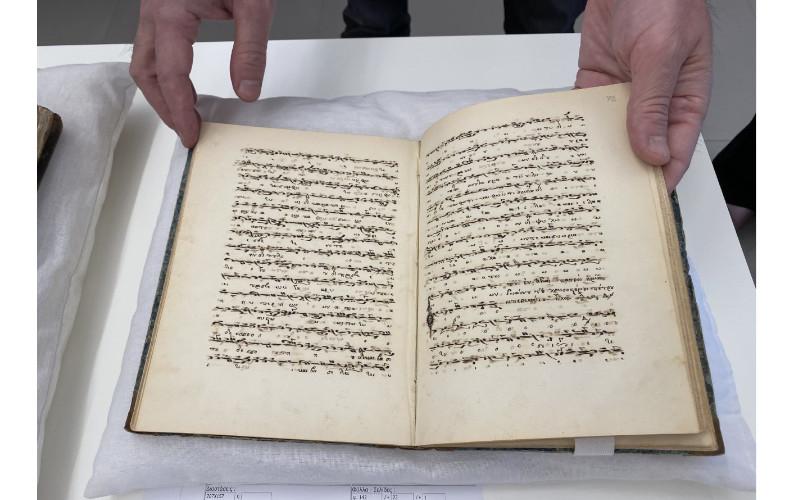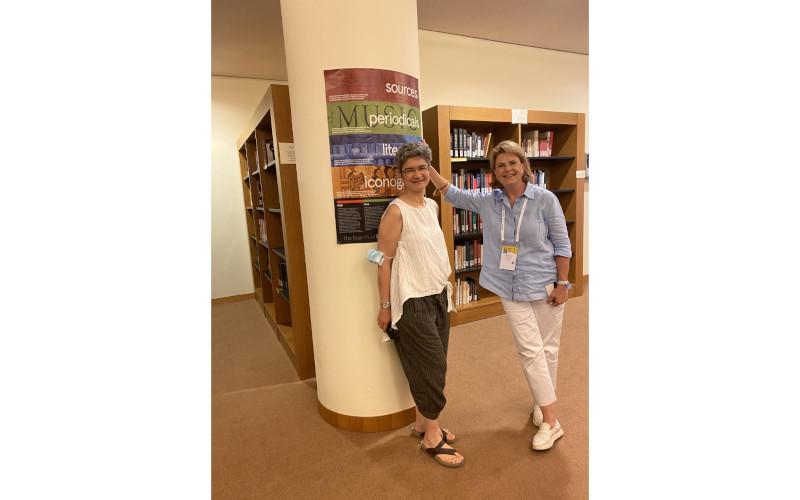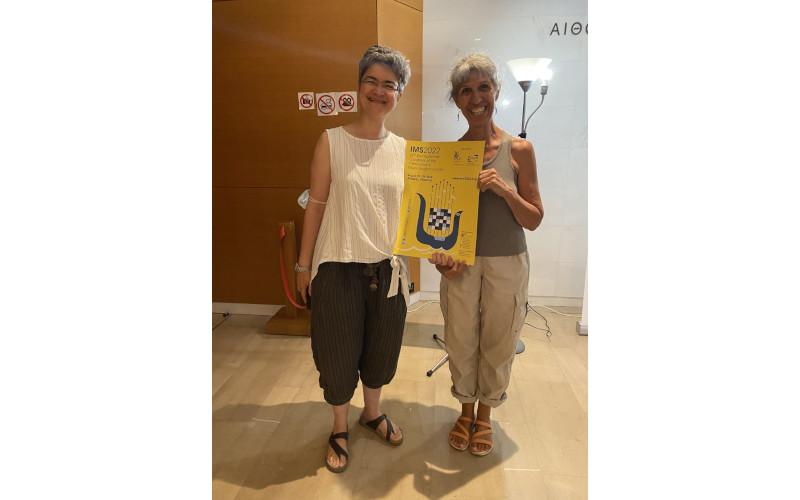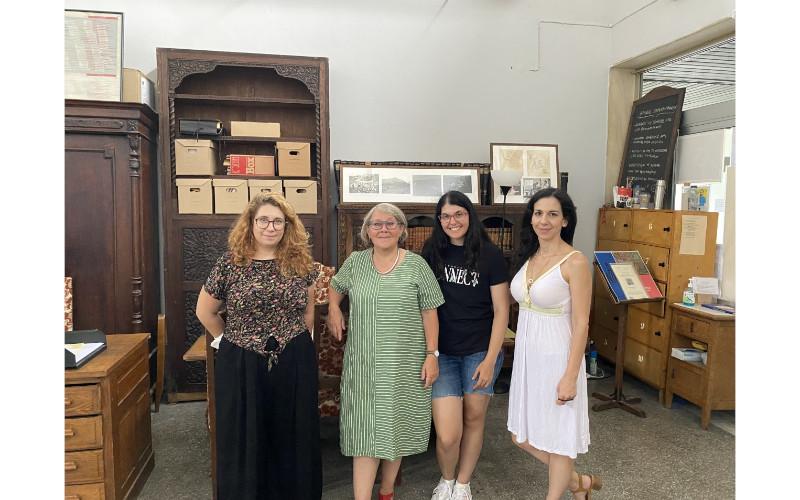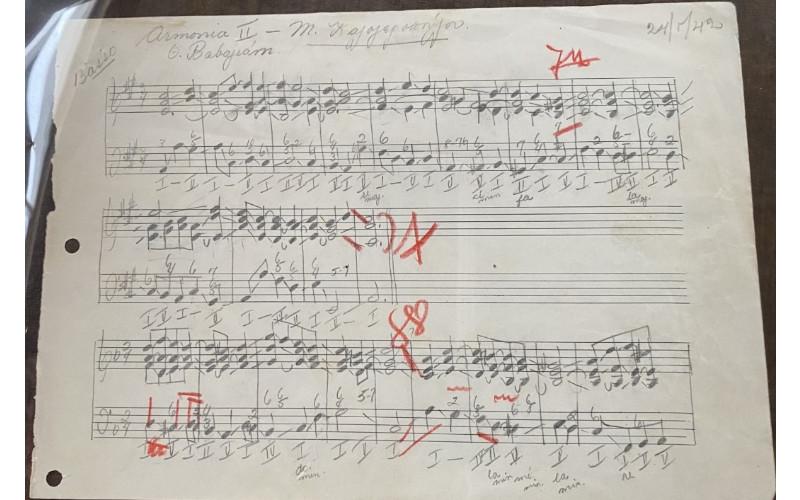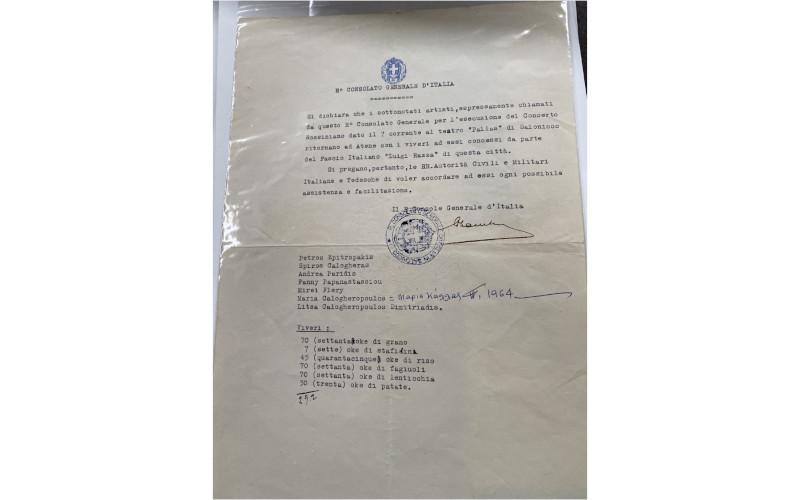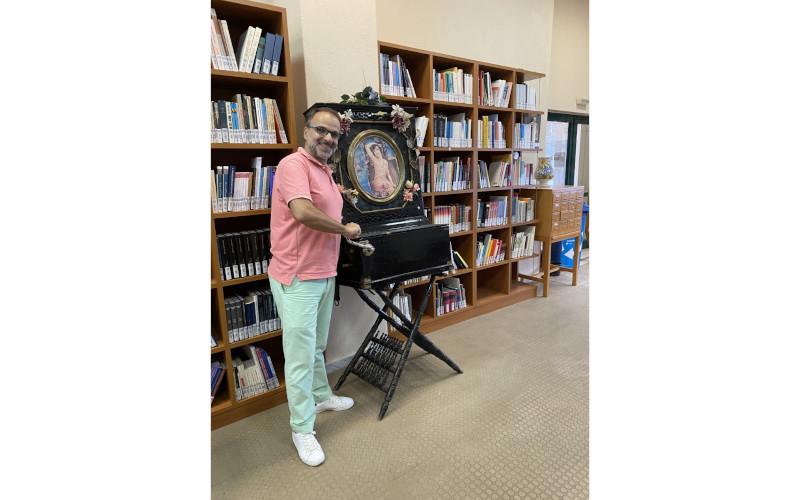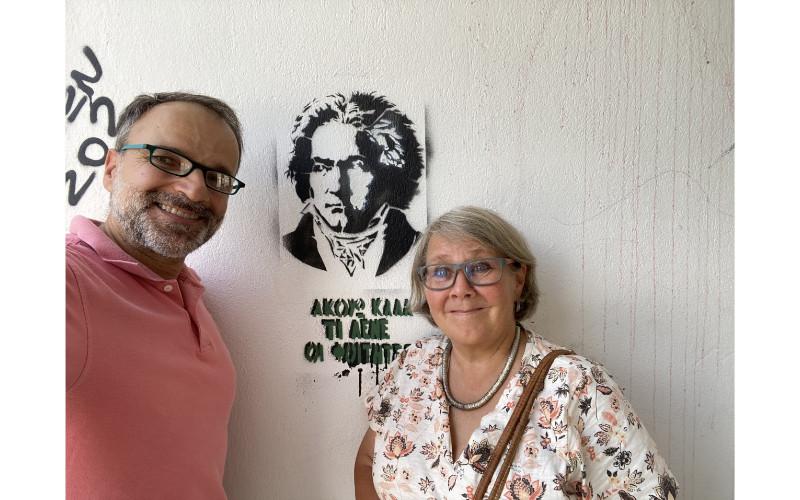I had the great privilege to participate in the 21st Quinquennial Congress of the International Musicological Society (IMS)(link is external), which was held in Athens 22 to 26 of August, under the auspices of the Departments of Music Studies of the National and Kapodistrian University of Athens and the Aristotle University of Thessaloniki. It was hosted by the Hellenic Musicological Society.
This was my first IMS congress as well as my first visit to Athens and later to Thessaloniki. Apart from attending the congress, my aim was to take this opportunity to promote IAML and to acquaint myself with members of the Greek IAML Branch, founded in 2016. Many Greek IAML members are musicologists and several of them were giving presentations at the congress. My week started with a lunch together with the IMS President, Daniel K. L. Chua (the University of Hong Kong) and the IMS President Elect, Kate van Orden (Harvard University, USA). We recalled the previous joint congresses we have held and agreed that we were eager to continue our collaboration (photo 1). The congress with IMS takes place every fifth year, but IMS also holds intercongressional meetings.
The theme of the congress was Music across Borders, “exploring artistic mobility throughout the centuries and countries”. It was clear that many speakers had found the theme inspirational. The programme was rich and consisted of keynote addresses, roundtables, paper sessions and more. Some sessions were sponsored by the Regional Associations and some by the Study Groups.
IMS has four Regional Associations: East Asia, Eastern Slavic Countries, Latin America and the Caribbean and Study of Music of the Balkans. There are also nineteen Study Groups, consisting of “IMS members sharing a common interest in an interdisciplinary theme of international scope”. The focus of these study groups varies greatly and they work more or less independently within IMS. One of the most active groups is the Cantus Planus, with liturgical plainchant as the focal point. I attended the session “Abbeys and Monastic Chant” that dealt with the Birgittines, an order founded by Saint Birgitta of Sweden in 1370. The participants were encouraged to step out of their medieval music comfort zones. This did not constitute a big challenge for me, since I was not aware that I had one!
In addition to the above-mentioned categories of sessions, there were also the Four R-Project Sessions. I was delighted to meet several well-known IAML members, such as Barbara Dobbs Mackenzie and Zdravko Blažeković (representing RILM), Balázs Mikusi and Jennifer Ward (RISM), Ben Knysak (RIPM) and Antonio Baldassarre (RIdIM). The presentations sponsored by the R-projects took place in the Athens Concert Hall “Megaron(link is external)”, unfortunately situated quite far from the main congress venue, which was the School of Philosophy at the Athens University.
There were typically more than ten sessions in parallel during the week. It may seem paradoxical, but I believe that this made the programme weaker. The sessions I attended, with the exception of the plenary sessions, had an audience of around ten people. I imagine that this must have been a great disappointment for the speakers, especially when you take into account that the next IMS congress will happen only in five years. The multitude of parallel sessions was also quite frustrating for other attendees, since there were many collisions of presentations on similar topics.
As with IAML’s congresses, the IMS congress offered several excellent concerts. One evening we enjoyed “Greek Art Music across Three Centuries”, presented by the Athens Philharmonia Orchestra. Another memorable event was a lunch concert with music for flute solo by contemporary Greek composers, performed by Theodora Iordanidou. I realized that there is a treasurere trove of Greek art music to discover, besides from the more internationally spread folk and popular music. I look forward to this adventure!
During my stay in Athens and in Thessaloniki I had the great pleasure to meet many members of the Greek IAML Branch and to visit their libraries and archives (photo 2). I would like to thank my hosts for their wonderful hospitality “officially”, like this. The Board of the Branch invited me to a lovely dinner one night (photo 3). Regretfully, the Secretary Sofia Tsopani was not able to join us.
My first study visit was to the new building of the National Library of Greece, situated not far from the seafront (photo 4). The library, and its twin building the Greek National Opera, was funded by the Stavros Niarchos Foundation and donated to the Greek state. The astonishingly beautiful two buildings were designed by the Italian architect Renzo Piano (photo 5). On top of the library, and stretching down a slope, is also a pleasant Mediterranean park that has become a popular resort for the Athenians. I was given an extensive tour of the attractive library. A special treat was an exhibition of rare materials and manuscripts from the collections. I was especially fascinated by examples of Byzantine music notation, something I had never seen before (photo 6).
My next study visit was to the Music Library of Greece, “Lilian Voudouri”, where Stephanie Merakos, Head of the Library, and Myrto Economides gave me a guided tour (photo 7. It is the only public library in Greece exclusively devoted to music and was created in 1997 by the Friends of Music Society. The Director of the Society, which was founded in 1953, is Alexandros Charkiolakis, a Board member of the Greek IAML Branch. The mission of the library is to support research in music, as well as serving the general public with books and scores. Access to the Library and use of its resources and services is free to all registered members of the Friends of the Library. The collections, comprising more than 140,000 titles, focus on Greek music and on Western art music in general. The Greek Music Archive is a major part of the library with all types of material that is related to Greek music. There are also more than thirty personal archives for example those of Nikos Skalkottas, Manolis Kalomiris, Mikis Theodorakis and many more. The library also holds a large amount of digital collections.
Adjacent to the Music Library of Greece, “Lilian Voudouri”, is the office of the Greek Composer’s Union (GCU), founded in 1931 - a section of the International Society of Contemporary Music (ISCM). There I met another IAML member, Maria Christina Krithara (photo 8). Ms Krithara is the Special Secretary on the GCU Executive Committee, working with publicity and promotion material. She informed me about the activities of the Union, such as concerts, competitions, workshops, lectures, congresses, publication and more. As so often before, I was amazed by what can be achieved with small means thanks to an abundance of enthusiasm and devotion.
The following day I was invited to the Athens Conservatoire Archives by Stella Kourmpana, who gave me a fascinating presentation of the collections (photo 9).
The Athens Conservatoire was founded in 1871 and is the oldest institution of performing arts in Greece. The material held in the Archives is therefore valuable not only for those interested in the history of the Conservatoire itself, but also in the music history of Athens and the rest of the country. Several famous people have studied here, for example Dimitri Mitropoulos, Nikos Skalkottas and Mikis Theodorakis. Another prominent member of the alumni was Marianna Kalogeropoulou, later known as Maria Callas (photos 10 and 11). The Archives include a large collection of printed and manuscript scores of Greek and foreign composers, as well as rare recordings, photographs and personal items. There are also traces left by world-famous composers and musicians, who cooperated with the Conservatoire: Camille Saint-Saëns, Sergei Rachmaninov, Wilhelm Furtwängler, Arthur Schnabel, Richard Strauss, just to mention a few. The work to digitize the material held by the Archive started in 2013 and is still in progress.
Several of the documents have a value also outside the music sphere. I was moved by a contract, which showed that the performers (among them Maria Callas) were given potatoes as payment for the concert – a grave reminder of the great difficulties the Greek population suffered during World War II.
As I have mentioned before, my week in Greece also included a trip to Thessaloniki. It was a real treat to visit this beautiful city, where IAML will hold its congress in 2026. My eminent host during two days was Aris Bazmadelis, who will be chairing the organizing committee. We were looking at the probable venue of the congress with a stunning view over the Aegean Sea, as well as different options for the Opening reception and the Farewell Dinner. We also discussed possible Wednesday afternoon tours. I can assure you that we can look forward to an outstanding congress!
My two-day stay finished with a study visit to the work place of Aris Bazmadelis, Senior Teaching and Research Fellow and Head of the Music Library at the School of Music Studies, Aristotle University of Thessaloniki (photos 12 and 13). The library was founded in 1993 and is one of the 45 special libraries of the university. It specializes, in addition to Western music, in Byzantine and Greek folk music.
I am truly grateful for my week in Greece, which was very nice and very fruitful. I am already looking forward to coming back in 2026, if not before! The weather during my stay was quite exceptional, according to my hosts. For a Swede it was very hot, but suddenly there were heavy rainfalls and strong thunderstorms. I had listened to the audio book “Mythos” by Stephen Fry to prepare myself for Greece and was reminded of Zeus during the extremely loud thunderclaps. He must have been terribly angry for some reason (Greek gods are rather temperamental). When I returned to Sweden with a temperature of + 13 degrees Celsius, I sorely missed the +30 C I had got accustomed to. Immediately after my return, the academic year started with what seemed to be an invasion of students. Back to my everyday duties!
Pia Shekhter, IAML President
- Zum Verfassen von Kommentaren bitte Anmelden.


